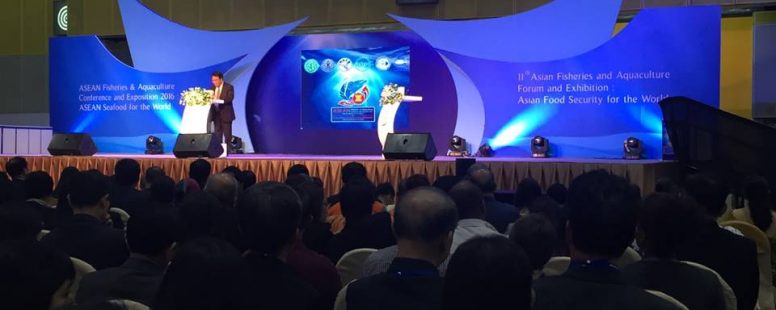11th Asian Fisheries and Aquaculture Forum – “Asian Food Security for the World”
Posted on behalf of Yavanna Puts – Master’s student, Wageningen University
Photo credit: https://www.facebook.com/aseanfisheriesexpo2016/photos_stream
Last week was the 11th Asian fisheries and aquaculture forum in Bangkok, Thailand. For my thesis research I decided to go there and find interesting people to interview, as well as join the scientific sessions and keynotes of the conference. First off, getting interviews during a conference is the easiest and most direct way to get data and contacts fast. Plenty of people carry contact cards, many are happy to talk and most are eager to provide their side of the story on controversial topics. Before going on this trip, I was warned that it would be difficult to talk about certain topics and that some of those I wanted to interview might not be accessible. But it turns out that most groups are quite open and willing to talk. Of course, it remains important to be respectful and to formulate questions on sensitive issues thoughtfully. The best interview Olivia (another NDEG Master’s student) and I got was with LPN (the Labour Rights Promotion Network) and their collaborative organization MAST, about labour in the fishing industry. Our discussion raised an important question – how sure are we that labour exploitation, trafficking and even just migrant labour takes place mostly and to the worst extent in large scale fisheries rather than small scale fisheries? And is the current direction of the discourse on labour in the Thai fishing industry sharp enough when it comes to discrimination, the reputation of fishing work, and the role of private versus public governance?
For the price of the conference I think it was beyond expectation. Some of the scientific sessions and speakers were not always as engaging and during one of the sessions some speakers simply did not show up, which was a shame. Content-wise there were still a lot of interesting topics, speakers and keynotes. Besides from the content, facilities were excellent, the food was wonderful and there was entertainment during the organized welcome reception organized by the Thai Department of Fisheries in the form of traditional Thai dancing, a puppet show and live music.
One of the highlights for me was Wong Poh Poh, an exceptional speaker, who provided the second keynote speech on the first conference day. His topic was ecosystem based adaptation to coastal erosion and sea-level rise, mostly through using mangroves. Mangrove roots adapt to sea level which makes them resilient coastal protectors from storm surges and erosion. Besides, the mangrove coastal engineering project is a low-cost, high-benefit, no-regrets adaptation response to coastal threats and issues, as well as a provider of employment and food. Another highlight was Ratana Chuenpagdee from Memorial University in Canada. Her topic was on seafood sustainability and the conflicting frames of crisis and overfishing versus health and sustainability that coexist within the fisheries management discourse. The complicated issues, she said, arise on the interface of the triple bottom line of Social, Economical and Environmental sustainability. To her, fisheries management is a ‘super-wicked problem’ – difficult, complex social issues influenced also by climate change and globalization. There is never a consensus on the role of coastal communities in sustainability, but small scale fishers make up the majority of all fishing. Yet, there is a research funding imbalance in favor of large scale fishing. Their project, Too Big to Ignore engages scientists and non-academics to contribute information on small scale fishers. They are always looking for contributors, so if you are out there, check out their amazing website and database: http://toobigtoignore.net/
Another highlight was Dr Derek Staples from the National Fisheries Association and consultant to the Thai fisheries regulation and fisheries management plan, who discussed the ecosystem approach to fisheries management (EAFM). The approach sees sustainable development of fisheries as conservation and sustainable use of resources in an equitable way. EAFM can increase food security, address threats and issues, and include the bigger system of ecology and economy. Staples discussed the role of science in EAFM, and how policy should be complimented with management actions through a systematic cycle of planning, implementing and monitoring.
Overall, the conference to me laid bare the need for more on-the-ground scientists to look into single species and small scale fisheries. Moreover, an improved understanding of the interrelations and practices of small, medium and large scale fishers in global supply chains is needed to be able to create fitting governance. The discourse on fishing can sometimes be overly technical with few scientists looking to include fisher perceptions and trust/compliance relationships with governments and other institutions.

